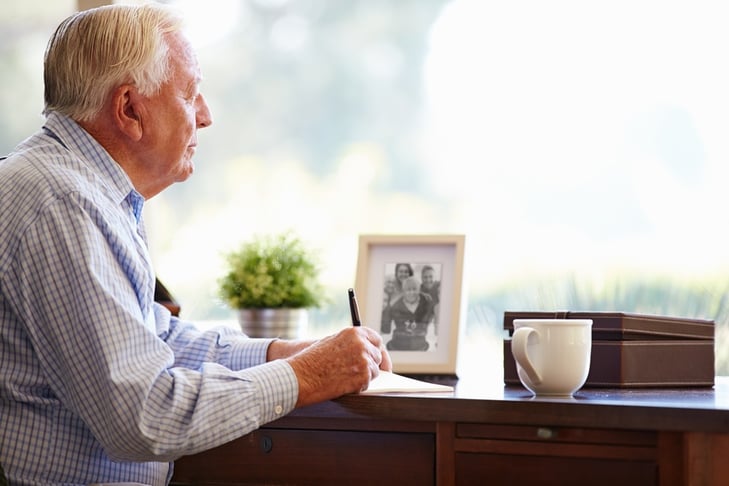Humans have an innate love of telling and hearing stories. Why?
It may have been born long ago, in front of campfires in the wilds, when small groups of our hunter-gatherer ancestors talked with each other long into the night. Storytelling may have developed in order to stave off fear of the dark and the unknown, to teach younger members of tribes the skills that they would need to survive, and to serve as a record of culture and history in the absence of written language.
Then again, there’s also the likelihood that storytelling simply served as entertainment in an era that otherwise had few diversions from the harsh realities of life.
Today, storytelling and oral history-taking have become a somewhat lost art. Many families don’t make strong efforts to record their histories. And that’s a shame, because older loved ones accumulate lifetimes of valuable experiences that should be passed down to younger generations of the family.
Their stories serve not only as teachable lessons, but also as ways that younger members of a family can get a sense of who their ancestors were, after those loved ones have passed on.
So, how can you encourage your grandmother, grandfather or aging parent to write a memoir and pass their life knowledge along? Are there ways that you can help them to write their memories down so you can share them with future generations of the family?
Today, let’s discuss 4 things you should keep in mind when encouraging your older relatives to write down (or to help you to write down) their life experiences.
1. People’s lives aren’t defined solely by what they did, but also by how they felt.
“When I overheard my father reminiscing with his old Army buddy about how desperate they felt as kids having to do menial tasks to earn money that would help their families — even plucking chickens — I realized I hadn’t heard much about his emotional life growing up,” Next Avenue contributor Bart Astor wrote.
There’s an excellent point in there. Compelling memoirs and interesting histories rely on emotional context.
So maybe you know that your father served in the Army in Korea, but what was that like? Your grandmother grew up during the Great Depression, sure, but how did that shape her later mannerisms, behaviors and life choices?
Emotions are often more strongly encoded memories than physical details. Your mother might be able to tell you that a particular song reminds her of a boy she dated once, and she might be able to tell you about the emotions that song evokes in her. But she might not remember the exact circumstances of when and where that song became associated with those emotions or with that person.
Whenever your older loved one mentions a strong emotional memory, dig deeper. Ask them to tell you the story that surrounds it.
2. Don’t confuse memoirs with autobiographies.
Some people feel overwhelmed when they think about writing down their life experiences, because they think they must write down all their life experiences, from beginning to the present day. But memoirs aren’t giant tomes. They’re just descriptions of discrete, important events.
You might ask your older loved one to tell you about a key experience that shaped who he or she became. When you have the whole story, ask about another important moment and write it down. Collect them into a larger narrative, or let each stand as a piece in and of itself.
And, as noted above, the most important point isn’t to collect all the nitty-gritty details about setting and place, proper names, dates and times — you just want your relative to tell about his or her emotional journey. You want to hear about his or her thought process in the moment of a life-shaping decision, because that will give succeeding generations a sense of who your relative was in life.
3. Enlist technology’s help.
There are a number of online resources that can help you and your loved one record memoirs and preserve them digitally.
My Living Legacy, for example, can teach you or your loved one how to make life experience videos via a smartphone. It comes with access to a range of thoughtful interview questions, to get conversations started, and breaks down the memoir composition process into several, easy-to-manage steps.
You could also help your loved one to share his or her stories with the larger world. You may have heard StoryCorps segments on NPR. StoryCorps sources stories from the general public. People who want to share their stories can schedule an interview with StoryCorps’ mobile story collecting unit.
4. Encourage your senior loved one to join a memoir writing group.
Many writers benefit from the opportunity to meet regularly and share their stories with other writers, in order to solicit guidance, advice and feedback. This can be a strong motivator for writers to complete a piece of work.
Here at Marjorie P. Lee, the “Writing Our Memoirs” group meets on the first Thursday of the month in the Lee Library to do just that. New members are always encouraged to join us. Or, start your own group of family and friends. Get together every other week to mutually support each other and share your progress in recording your family histories.
Spending time and talking with your older relatives is naturally the best way to learn more about them. You might try asking a few of these questions, to jog conversations and get the creative juices flowing. And once you and your senior loved start writing a memoir together, keep at it!













